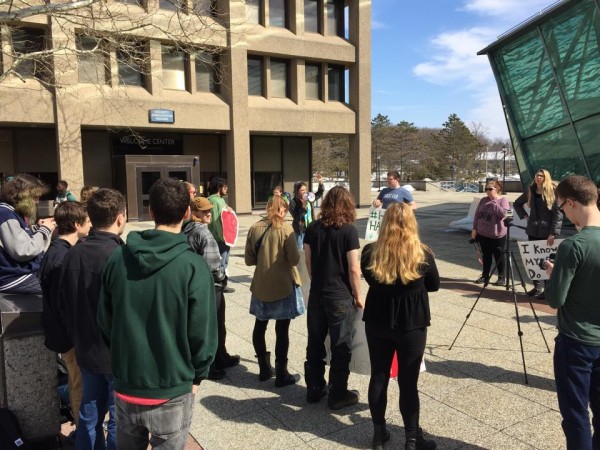
More than 30 student protesters gathered outside Haggerty Administration Building on Wednesday, March 11 at noon to advocate for a reform of SUNY New Paltz’s drug policy.
The Students for Sensible Drug Policy at SUNY New Paltz organized the protest in the wake of the college being ranked as having the highest number of on-campus drug-related arrests in the United States in 2013, as well as a controversial award ceremony to celebrate the University Police Department’s (UPD) efforts to enforce the drug policy scheduled for Friday, March 13 at 10 a.m.
New Paltz currently has a two-strike drug policy; after two strikes, students can be expelled from the university. It is the only university of 64 others in the SUNY system with a two-strike policy.
“Education, not expulsion!” was the rally cry of the afternoon, along with “I know my rights, why not you?” and “Why so many arrests?” Students held signs that read “Stop Expelling Students” and “Change The Marijuana Policy Now.” The protesters formed a circle and passed a megaphone around, allowing students to introduce themselves, share their personal stories and explain why they do not support the current policy.
Sabrina Bode, a second-year political science major who helped organize the event, spoke about her experience with UPD. She said she was arrested and had a “disheartening experience” that almost forced her to leave the university. She explained that she was asleep in her room when UPD officers came into her room and pushed her onto the floor.
“They acted harshly and brutally,” Bode said. “I was honestly very frightened for my safety that night.”
Second-year Black Studies and psychology major Rookie Reynoso also spoke out against UPD’s actions. She said that UPD targets students in the Student Union Building, in classrooms and outside of residence halls. Residence Assistants, she said, do not inform students if UPD is en route to search their rooms. She claims that this lack of communication puts students in danger of arrest or penalty strikes.
“Our two-strike policy should be reformed to a three-strike policy to give students more chances,” Reynoso said.
Reynoso also brought into question the racial bias of drug arrests, calling the war on drugs a “war on race.” Other students followed suit, crying, “We’re not just a number!”
“Rape and sexual assault are all over college campuses,” Bode said via megaphone. “We should be number one in those arrests!”
Protesters claimed that they were not advocating to legalize marijuana on campus. Instead, they called for reform. Protesters distributed small pamphlets to passersby, which contained information about students’ legal rights in the event of a drug arrest on campus. According to Bode, the protesters at the event wanted to ensure that their peers “know their rights” and that fellow students and administration hear their voices.
“Not enough students know about their rights,” Bode said. “We’re people, too, not just numbers. We need to be heard. We should [think of] ways to create better relations [between UPD and students].”
